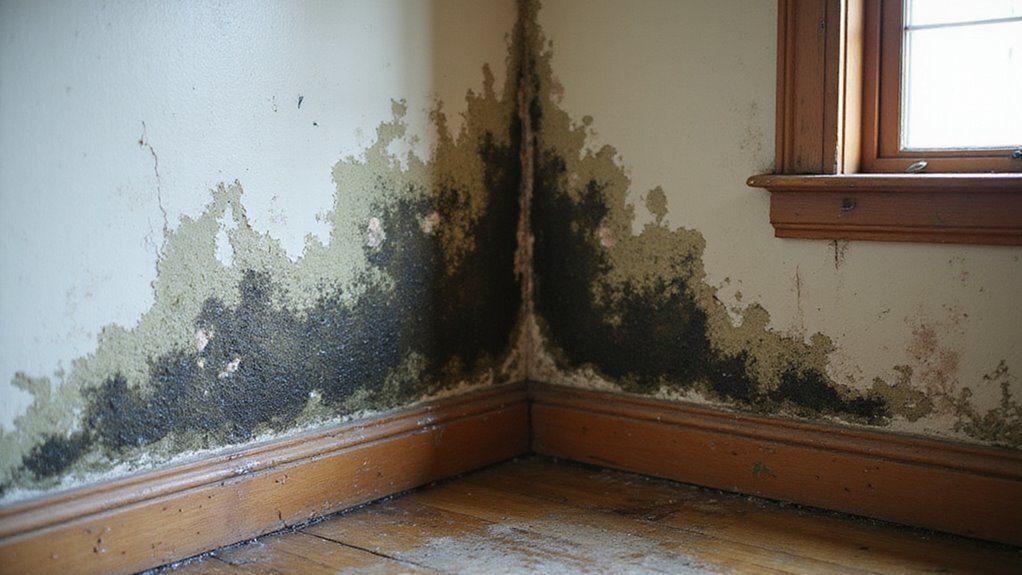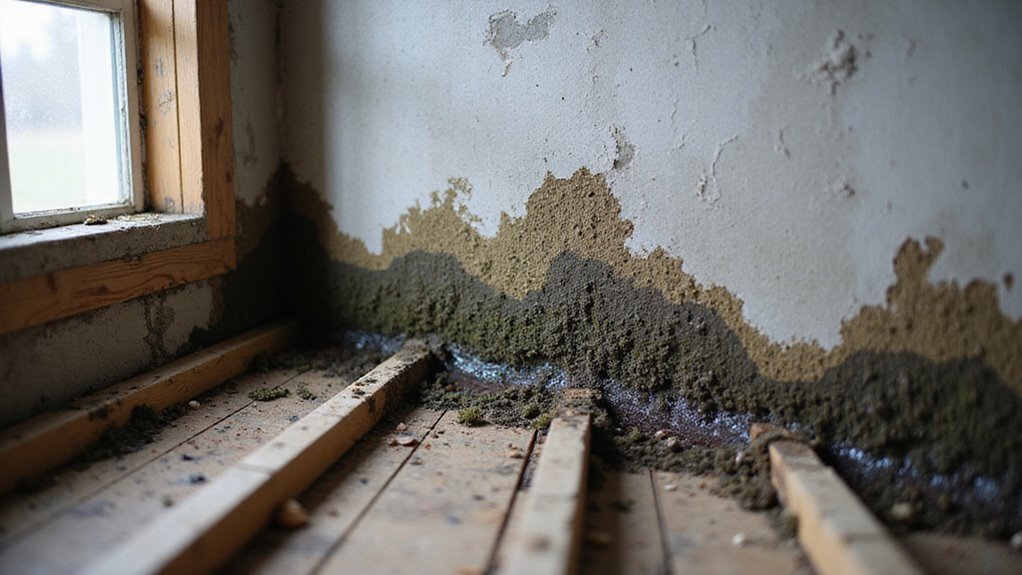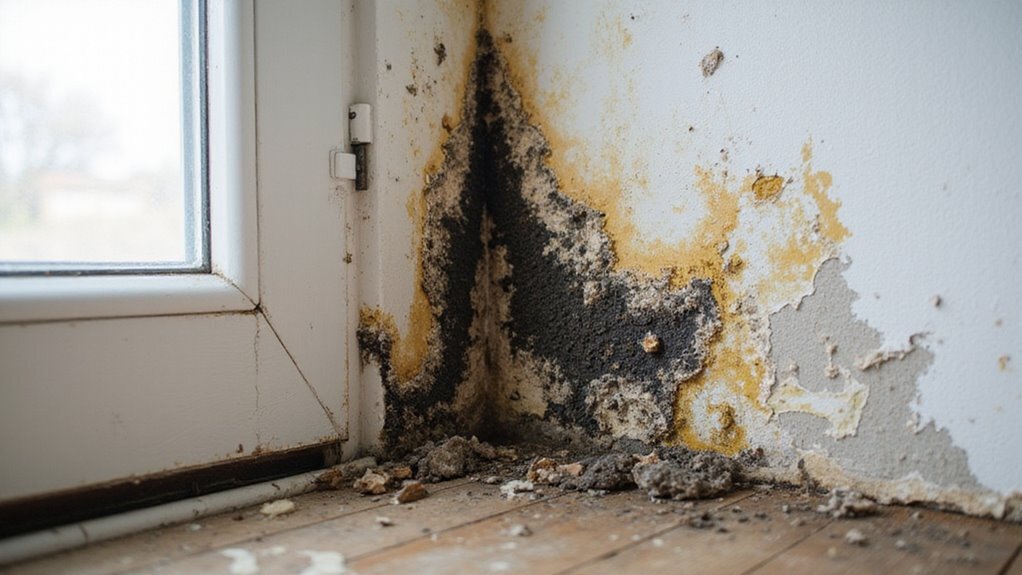Can You Still Sell a House With Mold or Water Damage in Kentucky?
Discovering mold creeping across your walls feels like watching your home’s value dissolve before your eyes. Mold and water damage can derail your Kentucky home sale plans. Buyers flee at the first sign, leaving you stuck with a deteriorating property. Honest disclosure and strategic selling options can help you close the deal successfully.
Yes, you can sell a house with mold or water damage in Kentucky. Kentucky law requires sellers to disclose all known material defects, including mold and water issues. You have options: repair before listing, sell as-is, or work with cash buyers.
In this guide I will explore everything related to selling a house with mold or water damage in Kentucky.
Key Takeaways
- Disclose all known mold and water damage to buyers to comply with Kentucky law and build trust.
- Repair mold and water damage before selling to increase property value and buyer confidence.
- Document repairs and inspections thoroughly to facilitate transparent transactions and legal protection.
- Consider selling as-is to cash or investor buyers who accept property issues and close quickly.
- Price the home 15-30% below market value to offset remediation costs and attract buyers.
What Is Mold and Water Damage in Homes?

Mold and water damage happen when moisture gets into your home’s walls, floors, or foundation. This moisture creates the perfect environment for mold to grow and materials to break down. You must disclose these issues to buyers, or you could face legal consequences.
Water weakens your home’s structure over time. Catching problems early protects both your investment and future occupants’ health. Proper documentation of repairs proves you’ve acted responsibly and builds buyer trust.
Why Is Selling a Water-Damaged House Difficult?
Water-damaged houses are hard to sell because buyers fear hidden issues and expensive repairs. Property values drop significantly after water damage, which limits your buyer pool. Most people won’t pay full price for a home with moisture problems.
Kentucky law requires sellers to disclose all known water damage. You must be transparent about every issue, or you could face legal trouble.
Honest disclosure actually builds buyer trust. Complete documentation of repairs and inspections helps facilitate a smoother transaction despite the damage.

“Brian with Ky Sell Now couldn’t have been any better to deal with. The offer was reasonable, they did what they said they would do, and did it when they said they would do it. Terms were good and they were flexible meeting our terms and needs.“
David Weinberg
How to Identify Mold and Water Damage?

To spot water damage or mold, look for stains, warping, or peeling paint on walls and ceilings. Focus on common problem areas like basements, bathrooms, and attics, where moisture tends to accumulate.
For certainty, hire a professional inspector to perform a thorough check using moisture meters and visual assessments.
Visual Signs of Water Damage
Water damage reveals itself through distinct visible markers you can identify during inspections. Ceiling water stains indicate past or active leaks. Paint and wallpaper may appear discolored, warped, or peeling when moisture lurks beneath surfaces.
Beyond surface issues, walls and floors often show moldy patches or feel damp to the touch. Buckling and bubbling surfaces are telltale signs of water intrusion. Early detection prevents costly mold development and structural deterioration, protecting your home investment.
Common Areas Prone to Mold Growth
Basements, bathrooms, and attics are the most common areas where mold thrives. These spaces trap moisture from poor airflow or leaks. Check for warning signs like discoloration, musty odors, or warped surfaces.
Additionally, inspect corners, spaces behind appliances, and window frames regularly. Quick action on water problems stops mold from spreading.
Early detection protects your family’s health and prevents costly repairs. It also helps you avoid complications when selling your property.
Professional Inspection Process
Professional inspectors use specialized tools and training to detect hidden mold and water damage. They examine problem areas like basements, attics, and bathrooms with moisture meters and thermal cameras.
Inspectors may collect air or surface samples for laboratory analysis. This testing reveals the exact type and extent of contamination. The process includes thorough documentation with photos and detailed reports.
These findings help you understand repair costs and meet Kentucky’s disclosure requirements. Professional assessments protect both you and potential buyers from future disputes.
Health Risks Associated with Mold Exposure
Mold exposure causes serious health problems, particularly for children, elderly individuals, and people with compromised immune systems.
Common health risks include respiratory problems, allergic reactions, asthma attacks, and infections. Most concerning is that hidden mold often goes unnoticed without professional inspection.
Watch for warning signs like visible mold growth, musty smells, or water stains in basements, attics, and bathrooms.
Ignoring mold problems damages both health and property value. Early detection and proper disclosure protect everyone involved in your home transaction.

“Brian was so easy to work with. They were quick and efficient. After several months of working with another buyer without closing the deal, we are thankful to have found him. We were able to get a deal done and finalized in just a matter of weeks! I would recommend Kentucky Sell Now to anyone.”
What Are Your Disclosure Requirements?
Kentucky law requires sellers to disclose known mold and water damage. You must inform buyers about any past leaks, existing moisture problems, or mold growth. This protects you from future legal claims.
Provide all inspection reports and repair documentation to potential buyers. Be specific about the location and extent of any damage. If selling as-is, state this clearly in your disclosure forms.
Complete honesty prevents disputes and builds buyer trust. Accurate disclosures fulfill your legal obligation and create a smoother transaction for everyone involved.
How to Sell a House with Mold Problems?

To sell a house with mold problems, you need to address the damage upfront and be transparent with buyers. Properly pricing the property and preparing thorough documentation can help manage expectations and avoid legal issues.
Clear marketing and full disclosure will make the process smoother and protect you from significant liabilities.
Fixing the Damage Before Selling
Should you fix mold and water damage before selling? Yes, fix the damage before you sell. Buyers trust homes with documented repairs more than ones with visible problems.
Professional mold remediation typically costs $500 to $6,000 depending on severity. Get a certified inspector to assess the full extent first. Document every repair with detailed reports and receipts. This transparency protects you from future legal claims.
Most importantly, fix all moisture sources to prevent the mold from returning. Honest disclosure of past issues and completed work builds buyer confidence and speeds up your sale.
Pricing Strategies for Damaged Properties
Price the property 15-30% below market value to offset mold remediation costs. Buyers expect significant discounts when mold is present. The severity of damage determines your final price point.
Disclose all issues upfront to build buyer trust. This transparency prevents legal problems down the road.
Calculate professional remediation estimates before setting your price. Accurate valuations lead to faster sales and smoother negotiations despite property defects.
Marketing a House with Disclosed Issues
Can You Sell a House with Mold in Kentucky? Yes, you can sell a house with mold in Kentucky. You must disclose the issue to potential buyers upfront.
Kentucky law requires sellers to complete a property condition disclosure form that includes known defects like mold. Honesty protects you from future legal problems.
Provide all mold inspection reports and remediation records to interested buyers. Show proof of any repairs or treatments you’ve completed.
This documentation builds buyer confidence. Highlight your property’s positive features alongside the disclosure to maintain buyer interest and demonstrate transparency.
Documentation and Reports to Prepare
You need a professional mold inspection report before listing your property. This report identifies the severity and location of all mold issues. Licensed inspectors provide unbiased assessments that protect you legally.
Additionally, gather all contractor reports that show completed remediation work. These documents prove you addressed the problem responsibly.
Transparency with these records builds buyer confidence and speeds up the sale process.
What Are Your Options for Selling?
You have several options to sell a house with mold or water damage. Traditional real estate sales can be challenging due to repairs and disclosure requirements, but selling as-is might reduce your profit.
Alternatively, working with investors or cash buyers can offer a quicker, hassle-free sale.
Traditional Real Estate Market Challenges
Homes with mold or water damage face significant obstacles in traditional sales. Buyers typically avoid properties with black mold or water damage due to health concerns and repair expenses. Kentucky law mandates full disclosure of these issues, which often scares away potential purchasers. As a result, securing financing becomes difficult and offers drop substantially below market value.
Remediation costs and inspection requirements add further complications. Without addressing these problems upfront, you risk legal disputes and prolonged market time. These challenges make alternative selling methods worth serious consideration.
Selling As-Is to Regular Buyers
You can sell your home as-is to regular buyers without making repairs. This approach works when you price the property fairly and stay honest about its condition.
Disclose all water damage and mold problems under Kentucky law. Provide documentation of the issues to potential buyers. Transparency builds trust and protects you from future legal disputes.
Some traditional buyers will walk away from damaged properties. However, investors and cash buyers often purchase homes needing repairs. These buyers understand renovation costs and can close quickly on as-is sales.
Working with Real Estate Investors
Real estate investors often buy homes with mold and water damage as-is. They handle all repairs themselves after purchase. This option works well if you want to avoid remediation costs before listing.
Investors expect property issues and price their offers accordingly. You’ll receive a lower sale price but eliminate repair expenses and liability risks.
The process moves quickly with full disclosure of all known problems. This route reduces legal concerns about undisclosed defects.
Cash Home Buyers Advantage
Cash buyers purchase properties quickly without requiring repairs. You can sell your home as-is, even with mold or water damage. This option saves you money on costly remediation work.
The process is straightforward and transparent. Cash buyers expect issues and factor them into their offers. As a result, you avoid the stress of traditional sales.
Most cash sales close within 7-14 days, letting you move forward faster with minimal legal complications.
How Much Value Does Mold Damage Reduce?
Mold damage typically reduces home value by 10-30%. The exact amount depends on how severe the problem is and where it’s located.
Buyers worry about health problems and cleanup expenses. They also fear future water issues might return.
Proper disclosure protects you from legal trouble later. Most insurance policies won’t cover mold removal costs. This limitation makes the property less valuable.
Address mold problems quickly to limit your losses. Transparency helps maintain buyer trust and protects your investment.
Ready to Sell Your Damaged Home Fast? Contact Kentucky Sell Now Today
Kentucky Sell Now buys damaged homes fast, even with mold or water issues. You can sell your property as-is without making any repairs. This saves you time and money on costly renovations.
Our team handles all moisture-related problems and ensures proper documentation. We provide transparent disclosures for every sale. Most importantly, you get a fair cash offer quickly. Contact us today to start your fast, honest home sale process.
Can I sell my house with mold or water damage in Kentucky?
Yes, you can. However, you must disclose the damage to potential buyers under Kentucky real estate laws.
Will mold or water damage lower my home’s value?
Absolutely. Visible mold or water issues can significantly reduce buyer interest and overall property value.
Should I fix the damage before selling?
It depends. Repairs may attract higher offers, but cash buyers often purchase “as-is” homes with damage.
Do I need to disclose past water damage?
Yes. Kentucky law requires sellers to reveal known defects, including prior mold or water problems.
Can I sell quickly without repairs?
Yes. Cash home buyers in Kentucky purchase damaged properties “as-is,” helping you sell fast without repair costs.
Sell Your House Fast in Louisville 💰
We buy houses in Louisville As-Is! No Hidden Fees or Real Estate Commissions. Sell Your House in Louisville And Close On The Date Of Your Choice. Simply Fill Out The Form, or call (502) 610-0070 today!

